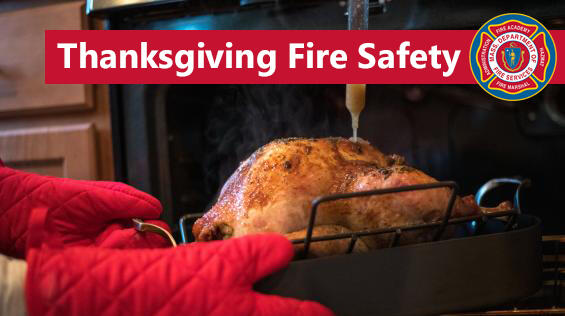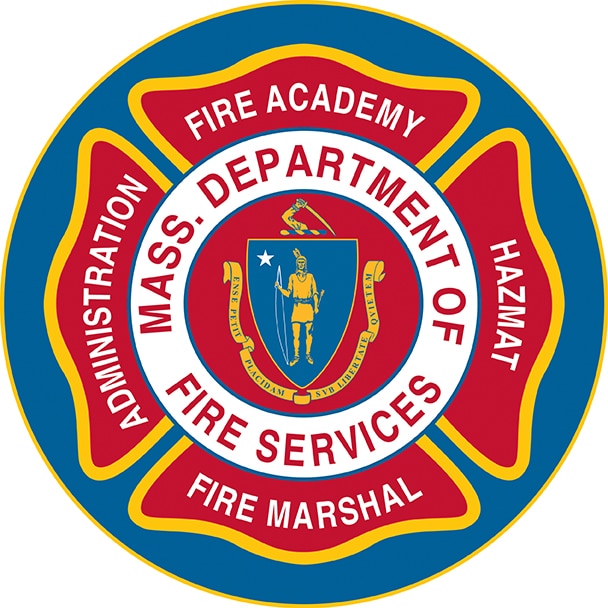- Department of Fire Services
Media Contact
Jake Wark, Public Information Officer

STOW — With Thanksgiving just a week away, State Fire Marshal Jon M. Davine is urging residents to make fire safety a priority in the kitchen as we approach the number one day for home fires in Massachusetts.
“There are about twice as many fires on Thanksgiving as on the next-closest day, and almost all of them start with unsafe cooking practices,” said State Fire Marshal Davine. “Don’t let a fire ruin this special day with your family and loved ones. Practice fire safety when cooking and heating your home, and be sure you have working smoke and carbon monoxide alarms that can alert you to danger.”
Thanksgiving Cooking Fires
There were 721 Thanksgiving Day fires in Massachusetts from 2018 to 2022, and about 70% of them started with cooking activities at home. That’s more than double the next-leading day, which is Christmas Eve. Last year, Thanksgiving cooking fires increased slightly, from 97 to 103, causing two fire service injuries and nearly $3 million in reported damages.
State Fire Marshal Davine offered cooking safety tips that everyone can follow to stay fire-safe in the kitchen this year:
Smoke and Carbon Monoxide (CO) Alarms Save Lives
- Be sure you have working smoke and CO alarms on every level of your home
- Check the manufacturing date printed on the back of the alarms: smoke alarms should be replaced after 10 years, and CO alarms should be replaced after 5-10 years depending on the model
- Never disable a smoke alarm: modern smoke alarms should have a “hush” feature that is much safer than removing the batteries
- If your alarms take alkaline batteries, replace the batteries twice a year: if you aren’t sure when they were last replaced, do it today
Keep it Clean:
- Clean up grease spills
- Keep groceries, food packaging, towels, and other flammable materials away from the stovetop
- Keep pot handles turned inward to prevent spills
- Create a three-foot child-free zone around the stove
- Only use the oven for cooking, not for heating or storage, and be sure it’s empty before you turn it on
Stand by Your Pan
- Stay in the kitchen when boiling, broiling, or frying food
- Set a timer when baking or roasting so you don't lose track of time
- Loose sleeves can ignite if they get too close to burners or heating elements: wear clothing with short or tight-fitting sleeves
Put a Lid on It
- In the event of a fire on the stovetop, cover the pan with a lid or cookie sheet to smother the flames
- Never try to move a burning pan or douse it with water
- For a fire in the oven or microwave, leave the door closed, turn off the appliance, and call the fire department
- Have the appliance professionally checked before using it after a fire
- If you can't extinguish the fire quickly, get to safety and call 9-1-1
- If your clothing catches fire, stop, drop, and roll to put out the flames. Put burns in cool running water for 10-15 minutes. Call 9-1-1 for help.
Turkey Fryers
A devastating turkey fryer fire in New Bedford caused severe injuries and displaced almost 30 people in 2020. Fire safety experts strongly discourage the use of outdoor gas-fueled turkey fryers that immerse the turkey in hot oil. There are no outdoor turkey fryers that have a listing from an independent testing laboratory such as UL or ETL, and the risk of hot oil spilling or igniting is high. The National Fire Protection Association states that home use of “turkey fryers that use cooking oil, as currently designed, are not suitable for safe use by even a well-informed and careful consumer.” They recommend using new “oil-less” turkey fryers.
Gas Ovens: A Source of Carbon Monoxide
Generally, the confined space of a closed gas oven does not produce enough carbon monoxide (CO) to present any dangers, but it can present a hazard if used for several hours consecutively – such as when roasting a turkey. If you have a kitchen exhaust fan, use it; if not, crack a window for fresh air when using the gas oven for a prolonged period. Working CO alarms are vitally important to protect you and your loved ones from carbon monoxide poisoning.
Home Heating: #1 Source of Carbon Monoxide, #2 Cause of Fires
Heating is the second leading cause of fires on Thanksgiving and the primary source of carbon monoxide in the home. Give your furnace an annual check-up, have chimneys cleaned and inspected by a professional at the beginning of heating season, and place space heaters on flat, lever surfaces where in locations where they won’t be bumped or tripped over. Keep a three-foot “circle of safety” free of anything that can burn around all heat sources.
For more information, contact your local fire department or the Department of Fire Services’ Thanksgiving web page.
###
